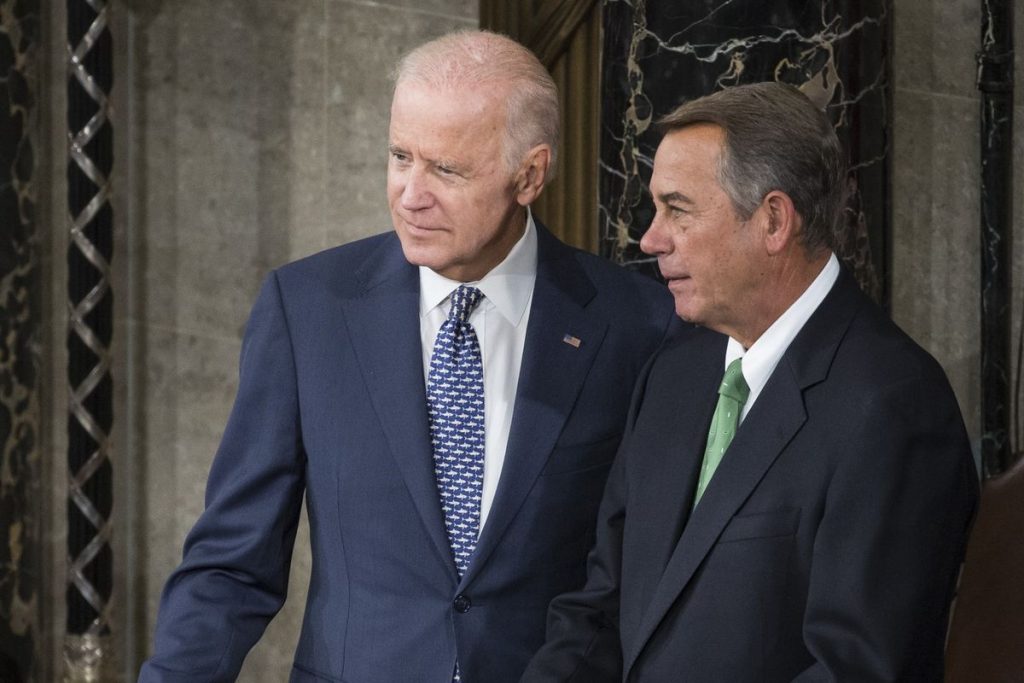By Prabhat Patnaik
Under pressure from globalised finance capital, most countries of the world have enacted legislation fixing the size of the fiscal deficit as a proportion of GDP; generally it is 3 percent, and in India it is 3 per cent for the centre and 3 per cent for the states. The US however has no such legislation; instead what it has is a ceiling on the absolute stock of public debt that can be held at any point of time. This is a very odd procedure, for as the economy grows, this ceiling has to be revised, and, not surprisingly, since 1960 the debt ceiling has been raised, revised or extended 78 times.
It currently stands at $31.4 trillion; and this limit has been reached, forcing the Biden administration to approach Congress to raise it. But the Congress dominated by the Republicans refuses to do so in a routine manner; it insists on certain budgetary cuts being carried out, which Biden, though willing to negotiate after the ceiling is raised, is unwilling to do as a precondition for it. This is the cause of the present impasse. Unless it is resolved, the Biden administration is holding out the prospects of a default on interest payments on past public debt, and on salaries for government employees.
There are two separate issues here. One relates to the rationale for government borrowing. When a government borrows rather than raising tax revenue for financing its expenditure, this fact is indicative of its unwillingness to tax the rich. In the US, as everywhere else in the world, the period of neoliberal capitalism has witnessed a substantial increase in income and wealth inequality, and raising taxes on the rich, whether through the corporate profit tax or through a wealth tax, should be the obvious way of raising resources to finance government expenditure.
Balancing public expenditure with equivalent taxation, even if levied on the rich, will not reduce wealth inequality. Since the working people are more or less constrained to balance their income with their consumption, it is the rich who carry out the bulk of the savings in any economy. Government spending of, say, $100, if financed by borrowing, puts an additional savings of $100 into the hands of the rich (if we ignore foreign transactions for a moment), without their having done anything to earn these extra $100, which the government then borrows. Expenditure financed by borrowing therefore increases wealth inequality, while expenditure financed by taxation does not. Expenditure financed by equivalent taxation simply leaves wealth inequality where it was to start with.
The fact that neither the Biden administration nor the Republican-majority Congress is considering heavier taxation of the rich, is symptomatic of complete bourgeois dominance over US politics; they both conduct the debate leaving out this alternative. Biden issues dire threats about government employees going without salaries, never once mentioning the possibility of raising taxes on the rich; and the Republicans never once justify their intransigence by suggesting that taxes on the rich should be raised instead.
All this is hardly surprising in the leading bourgeois economy of the world. There is however a second issue here that merits attention. Going beyond the immediate disagreement between the Biden administration and the Republicans, there is a deeper underlying difference in economic understanding and economic strategy. The two approaches can be called respectively the “liberal bourgeois” and “orthodox bourgeois” approaches.
The former has an awareness of the long-term impasse to which neoliberal capitalism has entered; and would like a revival of Keynesian policies in the US. It is not averse to enlarging the fiscal deficit, for which the debt-ceiling has to be revised. Of course its demand to raise the debt-ceiling is not motivated directly or immediately by the desire to adopt expansionary policies; but the demand to raise this ceiling and its outlook on the need for expansionary policies are interlinked. True, such policies have been put on the backburner at present because of the upsurge in inflation that has occurred in the US and in the world as a whole.
The “liberal bourgeois” approach does not see inflation control as the sole or over-riding objective of economic policy. A reduction in unemployment and the achievement of a high level of economic activity are also considered important policy objectives; these will come on to the agenda the moment inflation has been reduced to “manageable” levels. It follows that while inflation-control remains a matter of immediate concern, the imposition, for this purpose, of an acute recession on the economy through a drastic curtailment of government expenditure is sought to be avoided.
By contrast, the “orthodox bourgeois” position sees inflation control as the over-riding objective. It favours cuts in government expenditure incurred on “transfers” to the working people, or on welfare schemes meant for them. These cuts are thought of as necessary not just for achieving control over inflation but as a perennial feature of economic policy.
Keynes himself had to contend with this “orthodox bourgeois” position, articulated in his time by City of London, the financial centre of Britain. In fact, the point of his theory was to show that in a situation of unemployment and unutilised capacity, namely in a situation of demand constraint, a fiscal deficit, ignoring possible balance of payments implications, does no harm whatsoever (other than increasing wealth inequality when compared to tax financed government spending, as noted above); it certainly does not “crowd out” private investment as the City of London and the British Treasury (influenced by the City) were arguing.
Keynes himself was a defender of the capitalist system. But he was writing in the shadow of the Bolshevik Revolution, and he believed that unless the system provided higher employment, the disgruntled workers, inspired by the Soviet example, would overthrow the system. In fact, the main difference between the “orthodox bourgeois” position (reminiscent of that of the City in the 1930s) and the “liberal bourgeois” position (whose lineage can be traced back to Keynes), lies precisely in this: the former believes in coercion, including through a massive reserve army of labour, to cow down workers into acquiescing in the preservation of the system, while the latter believes in enlisting workers’ support, through the avoidance of massive unemployment and through appropriate “transfers” towards them, for the system’s preservation.
It is these two differing perspectives that are implicit in the current American debate over raising the debt-ceiling. The “liberal bourgeois” position which entails significant State intervention in the capitalist system runs contrary to the spontaneous tendencies of capitalism; this is why Keynesianism was overthrown by the neoliberal regime in the first place. The attempt to revive it when neoliberalism has run into a dead-end, will also run into severe contradictions, and will be a still-born one.
I shall mention just one particular contradiction here. The balance of payments implications of a fiscal deficit were mentioned above in passing; to the extent that the demand caused by larger US government spending partly “leak out” abroad, in the form of higher import demand, when such spending is financed by larger borrowing, it enlarges the balance of payments deficit. Larger, borrowing-financed, government spending therefore presupposes that foreigners are willing to hold US government bonds against the extra goods they sell to meet this higher US import demand.
This presupposition of course is valid as long as the dollar remains the world’s reserve currency, considered universally to be “as good as gold”. But if the US imposes sanctions, not just against an odd “hostile” country, but against scores of countries, then it begins to wear thin. In fact, three things happen: first, the US forgoes the possibility of importing from these countries, which means a rise in its cost of production, and a continuation of inflationary pressures. Secondly, it encourages the getting together of “sanctioned” and “non-sanctioned” countries to form bilateral arrangements that eliminate the dollar as medium of circulation and hence reduce the willingness of all these countries to hold dollar-denominated assets. And third, the fact that a country that holds dollar-denominated assets may suddenly face sanctions which “lock” its holding of such assets, preventing their use by it, also increasingly makes the dollar an unattractive currency to hold.
An obvious problem with the “liberal bourgeois” position of the Biden administration is that its bourgeois liberalism is at sharp variance with its “sanctions” against a large chunk of the world that area fall-out of “neo-con” imperialist aggressiveness. The US cannot ride for long a Keynesian and a “neo-con” boat simultaneously in today’s world. (IPA Service)
Courtesy: People’s Democracy

 Saving The Public Sector Banks From Privatisation Is The Prime National Task
Saving The Public Sector Banks From Privatisation Is The Prime National Task 